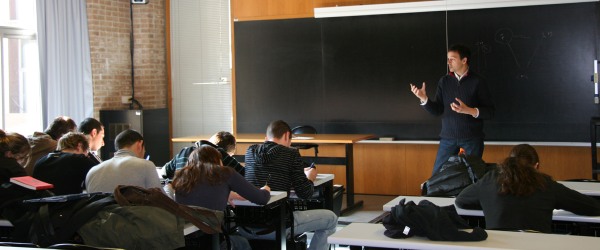Wide range of university courses in Spain
Have you decided to study in Spain? Welcome! You should know that the Spanish university system is currently adapting to the European Higher Education Area (EHEA), so if you want to further your studies in a Spanish university, here are some guidelines on how it works, to make it easier for you to choose a course.
Types of universities
In Spain there are public and private universities.
According to data from the Ministry of Education, Culture and Sport, in the 2011-2012 school year there were 79 universities (50 public and 29 private) all over Spain, and 2,413 university degrees (“Grados”), 2,758 official Masters and 1,680 Doctorates were verified.
At the following link you’ll see which universities you can currently study at:
http://www.mecd.gob.es/educacion-mecd/areas-educacion/universidades/educacion-superior-universitaria/que-estudiar-donde.html
Which is the best university for you?
The universities are organised into Faculties, which in turn have different departments that specialise in specific aspects of certain sciences. (For example: one of the faculties at the Complutense University of Madrid is Information Science, which offers degrees in Journalism, Publicity, and Public Relations and Audiovisual Communication.)
Get information on where the faculty is situated, because some of them are far from the town centre.
Types of university degrees
The university courses that are available may be official or non-official (also called university’s own degrees). Each degree has a cut-off mark (which you will need to attain in order to access the course), credits to be gained and a price, which you will need to find out.
1. Official degrees are adapted to the European Higher Education Area (EHEA) and are therefore officially valid in all the countries in this area (which includes the 27 countries in the European Union). These degrees can be official recognised/validated in other countries that are not part of this area (Latin American, Asian, African countries, etc.)
a) There are different types of degrees: “Grado” (first stage of official university courses, with the aim of training students in one or several disciplines). It has 240 European credits or ECTS over 4 years), Master's degree (it is the second stage of university and the aim is to offer the student advanced, specialised or multidisciplinary training. It has 60-120 European credits or ECTS, lasting one or two years); and Doctorate (it is the third stage of university studies, and includes a training period of about 60 credits and a research period, at the end of which you will have to write a thesis. It also lasts a maximum of three years full-time, but you can also go part-time for five years. Just choose the most suitable option for you, depending on whether you are working at the same time or have other things to do).
b) There are double degrees which combine two different university courses. One of the most popular is Business Administration and Management, together with Law.
c) In Spain it is not compulsory to study a Master’s degree, only exceptionally when the Masters prepare you to carry out regulated professions in Spain. With exceptions, you’ll be able to work professionally with a bachelor’s degree (“grado”).
d) Masters and Doctorates are also called Post-graduate courses.
e) Both the undergraduate degree and Master’s degree are connected to the following areas: Arts and Humanities, Science, Health Science, Social and Legal Science, and Engineering and Architecture.
f) In general, to apply for a Doctoral programme you will need to meet the following admission requirements (although there are other conditions):
You must have a Spanish bachelor’s degree or equivalent, and a Master’s degree. Or:
You must have an official Spanish university degree, or from another country in the European Higher Education Area, which allows you to access a Master’s degree, and you must have earned at least 300 European credits or ECTS in your official university studies – 60 of which must be from a Master's degree.
You must have an official Spanish bachelor’s degree which gives you at least 300 European credits or ECTS, in accordance with the rules of Community law.
You must have a degree from a foreign education system, without having to officially recognise it, with prior authorisation from the rector.
You must have completed another Spanish Doctorate earned in accordance with previous university regulations.
g) Remember that in official degrees the curriculum works with the European Credit Transfer System or ECTS, which measures the time required to pass a subject (taking into account theory and practice lessons, essays, etc.). An ECTS credit is equivalent to 25-30 hours’ work.
2. Non-official or university’s own degrees are not officially valid within the European Higher Education Area (EHEA) and they cannot generally be recognised in other countries, but they may be useful in the job market (that is, they are highly valued by companies) and their approach is usually much more practical.
They are divided into non-official undergraduate degree (“grado”), non-official Magister or Master, Specialist and Expert.
If you are interested in this kind of non-official degree, we recommend checking with your national Ministry of Education or public entity in charge to see if it can be recognised/validated in your country.
Find a course
You will find the range of university courses and cut-off marks at the following link on the Ministry of Education, Culture and Sport’s site:
http://www.mecd.gob.es/servicios-al-ciudadano-mecd/catalogo-servicios/estudiantes/formacion/ofertas-titulaciones.html
Academic Calendar
In general, the university academic calendar in Spain is divided into two semesters (although you may find that some universities have three- or four-month terms):
First semester: from the second fortnight in September approximately to the end of January. The exam period usually starts during the first fortnight in January until mid-February.
Second semester: from mid-January to the end of May approximately. The exams take place at the end of May and throughout June.
Bear in mind that these periods are for the Spanish “grado” undergraduate studies. If you want to study a Master’s degree or Doctorate and you want to see the academic calendar, we recommend getting in contact with the university.
Remember that you will have two holiday periods: Christmas (end of December and beginning of January) and Easter (in March or April, the dates vary) plus public holidays that each university observes.
Things to remember
The pre-enrolment and enrolment periods for new students usually start in June-July. Sometimes, for certain courses, some universities require you to start the application process up to a year before starting the course. Make up your mind in time.
If you want to study a bachelor’s degree (“grado”) in which the number of applicants exceeds the number of available places, it will be harder to enrol and therefore the cut-off mark will be higher, because several students compete for the same place. You will find more information on cut-off marks at the following link:
http://universidad.es/es/en-espana/estudiar-en-espana/normativa-de-acceso/estudios-de-grado-y-posgrado/notas-de-corte
When choosing a university, it is advisable to take into account its prestige, its facilities, its location, whether it has volunteering programmes, possibility of internships, and especially, if it has international exchange programmes and offices to guide international students with their application processes.
Remember that the admission requirements for certain courses (credits, documentation, etc.) may vary in each university. Check the requirements at the university you have chosen.
When you start the course, ask each lecturer to what extent it is compulsory to attend lectures. Lectures usually last one or two hours and many subjects combine theory and seminars and practical sessions.
Even though there are official exams at the end of each semester, lecturers may set exams and ask for essays during the year, as ongoing assessment.
For students who do not come from EU member states whose official language is Spanish, universities may require language tests.
If you are worried about the language, at many universities there are also Spanish Language and Culture courses (intensive, focusing on International Relations, Science, etc.). Many universities also offer certain university courses in English, where the contents, level and number of credits is exactly the same as the equivalent Spanish courses.
You will find detailed information on courses in foreign languages at the following link:
http://universidad.es/en/spain/study-spain/degrees
Spanish universities are also signed up to several International Exchange Programmes (they are especially interesting if you only want to study in Spain for a short period of time). Some of them are funded by the European Union and others are funded by the actual university. Every programme has special features and different enrolment periods. The most popular is, without doubt, the Erasmus Programme (which allows you to study in a European country for 3 to 12 months).
Other interesting links
Red Universitaria de Asuntos Estudiantiles (RUNAE) – Student Affairs University Network
http://www.crue.org/Estudiantes/RUNAE/Paginas/RUNAE.aspx?Mobile=0
Campus Vivendi. You will find a list of Spanish and European student organisations
http://www.campusvivendi.com
Instituto de la Juventud (INJUVE) – Youth Institute
http://www.injuve.es/







